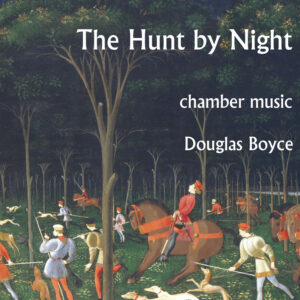Douglas Boyce: Hunt by Night (CD Review)
Douglas Boyce
Hunt By Night: Chamber Works by Douglas Boyce
counter)induction; Trio Cavatina; Beth Guterman Chu, viola; Schuyler Slack, cello,
Ieva Jokubaviciute, piano
New Focus CD
In selecting the fifteenth century “L’Homme Arme” tune as the centerpiece for his quintet by the same name, composer Douglas Boyce demonstrates an affinity for connecting music of the past with an individual contemporary voice. The piece leads off his portrait CD Hunt by Night, and it matches a structural integrity akin to Renaissance talea with an energetic, propulsive demeanor. Chamber ensemble counter)induction impressively navigates the intricacies of the score, particularly impressive in their rhythmic coordination of a number of turn-on-a-dime entrances.
Two pieces from Boyce’s A Book of Etudes both deal with rhythm in still more intricate fashion. Stretto Perpetuo, played by cellist Schuyler Slack and pianist Ieva Jokubaviciute, deals with, as its title suggests, constant and varied kinds of overlap. A recurring ostinato is broken into sections where the opening gesture is treated in different tempos and various playing techniques. Metric modulation further complicates the structure of Stretto Perpetuo, but Slack and Jokubaviciute present a detailed and robust performance of even the work’s thorniest challenges. The title work, a trio played by clarinetist Benjamin Fingland, pianist Ning Yu, and cellist Caleb van der Swaagh, members of counter)induction, is filled with ostinatos as well; its three-fold repetitions of small melodic cells take on a post-minimal cast. Fingland plays impressively, employing glissandos and rasps reminiscent in places of Klezmer. Elsewhere, all three instrumentalists engage in an elaborate game of follow-the-leader that suggests the title’s hunting metaphor. The coda reenacts this passage in slow motion, culminating in a delicately arcing descent to the bass register.
Piano Quartet No. 2 is sinuously textured, with glissandos and repeating fragments providing a counterweight to angular melodies. Repetitions are offset to create a kaleidoscopic panoply of gestures. Trio Cavatina, joined by violist Beth Guterman Chu, provides supple sliding tones, explosive repeating gestures, and characterful delineation of the piece’s sectional progress and playful conclusion.
Sails Knife-bright in a Seasonal Wind, the title taken from Derek Mahon’s poem Achill, was written for counter)induction members violinist Miranda Cuckson, guitarist Dan Lippel, and percussionist Jeffrey Irving. Boyce dedicates the piece to his then four year-old son, and the younger Boyce’s loves – a half-size guitar, movement and dance, and the moon and the stars – all evoke touching moments in the piece. Lippel’s playing takes on a puckish character, while Cuckson’s violin outlines a jaunty dance tune adorned by colorful percussion from Irving. Finally, the games end, naptime encroaches, and we are treated to a dreamscape presented as a gentle lullaby. Boyce moves easily between technical fluency and emotional resonance, making Hunt by Night a most satisfying collection of his music.
-Christian Carey
